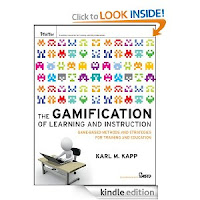Greetings World-
I know it's been several days since I spoke my mind, but I was on vacation and enjoying the summer weather. But now it's time to get back to sharing my thoughts. Today's topic: Gamification. If that's a new term to you (which it still sorta is to me), here's the wikipedia entry:
Gamification
Gamification
Or if you feel like some light reading, Amazon has this book for $2.99 on the Kindle:
I'm currently working on two books:
The Gamification of Learning and Instruction and eventually
I've kept an eye on Twitter recently and noticed that there is some opposition to this idea of turning learning into more of a game-like experience. Using the mechanics of something children understand to teach them makes sense. I've blogged about my ideas using experience points and leveling in the past and so I will stick to my guns in believing in this idea.
I think to some this idea of rewarding students for their work in these ways reveals the timeless differences in pedagogical thought. For example, remnants of an "Old Guard" may not have the desire to implement something like gamification or game theory into their classrooms. They also may not have the experience or background with modern video games that would allow them to be comfortable with such an idea.
For others, rewarding students for "doing what they are supposed to be doing" is just against their principles. These teachers usually use phrases such as "when I was in school" or "when I was a kid" or "I wasn't taught to teach like that."
Others will misuse this type of thinking. Gamification isn't really an excuse to play Call of Duty instead of talking about World War II. It's using the concepts that make up the basis of the video gaming experience in the classroom.
This is not "giving in" to students. This is not lowering expectations. To me, it's actually raising them. The days of drill and kill, strict discipline, doing homework because the student is supposed to, paying attention because the student is supposed to, and not having to worry about engagement are gone. They've gone the way of the 3.5 inch floppy, chalk boards, and the card catalog.
This is not "giving in" to students. This is not lowering expectations. To me, it's actually raising them. The days of drill and kill, strict discipline, doing homework because the student is supposed to, paying attention because the student is supposed to, and not having to worry about engagement are gone. They've gone the way of the 3.5 inch floppy, chalk boards, and the card catalog.
I equate my limited by growing concept of gamification to teaching diverse students. Students learning to speak English would suffer if taught only in English. What if we taught students with visual impairments how to read only by pointing at letters? What if we taught students with learning disabilities exactly like every other student, with no modifications? We think outside the box, we innovate, and we modify the content and/or the experience for students who need it in order to achieve.
That's all gamification is... just on a bigger scale.
Video gaming requires a set of skills. That may be a stretch to some but is. Problem solving, planning ahead, and critical thinking can play a part in some (not all) games. Additionally, there is a tangible reward, a recognition of the achievements made. Gamifiying your classroom to provide incentives like this creates overt competition, and may actually lead to better results.
But the bottom line is making the classroom into something more readily understood and digested by students is a good idea. It's like tapping into a special dialect of the kid language, the kid experience. While it may not be for everyone, gamification is for me.
But that's because I speak that language. I'm 27 going on about 15.
More to come on this topic down the road. I should get a badge for this post... because it makes me happy and would cost absolutely nothing. That's another thing. Create these badges or awards digitally... and they're FREE.
Kid-friendly and budget-friendly... I hope a superintendent reads this, and then hires me. I'm 6 months from being able to be a technology director with my administrative certificate :)
Now if we could only gamify grading...
I'm out.
Mr. J.
.jpg)


No comments:
Post a Comment